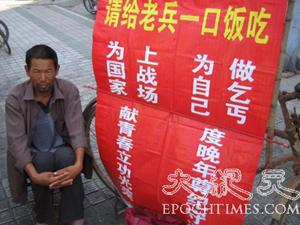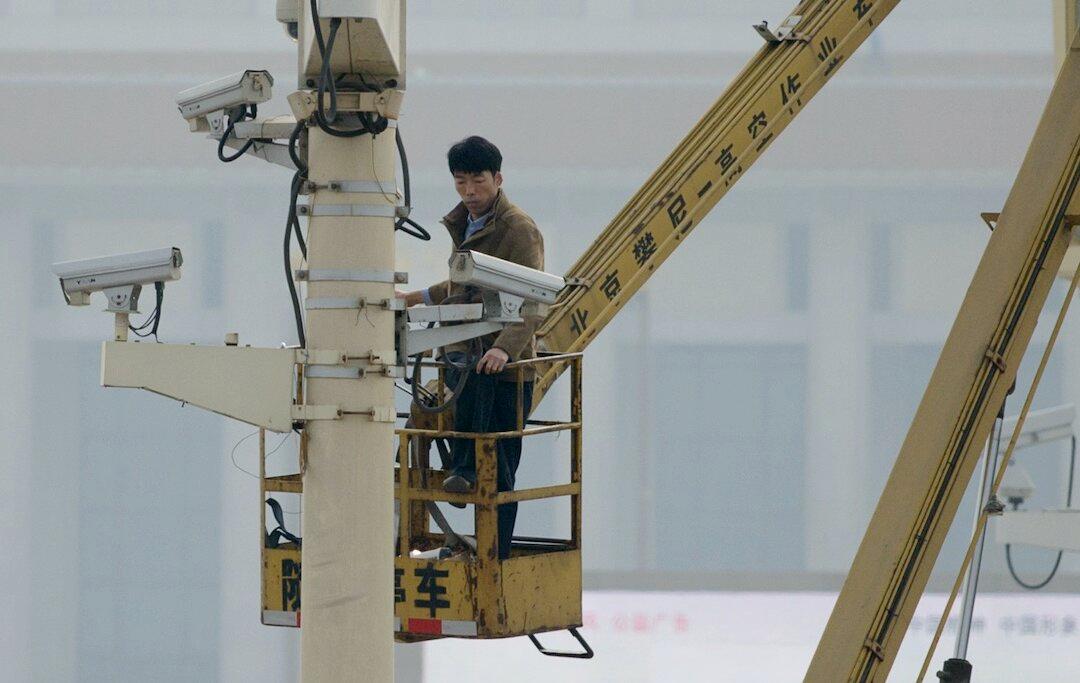Wang Shengzhu, a former military officer in China’s Yantan City, Shandong Province awaits his long-delayed wages and welfare, delayed because the local authorities failed to follow policies. Wang lacks the finances to pay for his cancer and cardiovascular treatments.
Wang has repeatedly appealed to the authorities, but his problem remains unsolved. He is now too physically weak to make appeals.
Wang is in the late stages of lung cancer and has been diagnosed with severe heart disease. He has spent over 200,000 yuan (US$ 25,867) on medication. Unable to afford treatment at large hospitals, Wang has the community doctor give him IV drips at his home. Wang uses an external oxygen supply and is no longer able to walk more than a few steps. He has not left his home for a year.
Wang joined the Chinese Army in 1964, retired from the military in 1978, and began to work in a flour factory in Yantai City. He lost his job in 1996 when the factory was closed down due to poor management. Wang did not receive any pay for four years. He finally began to receive a 600-yuan ($77) monthly pension when he retired in May 2000.
Wang said that he is aware of two official documents, No. 82 and No. 29, issued in 2002, which address issues concerning financial support for former military officers. He submitted a petition citing these two documents to the Yantai municipal office, the National Funds Bureau, and the Food Bureau to have the policies implemented so he could address his financial and medical problems. None of the petitions has received a response.
Wang said, “When the factory claimed bankruptcy, the factory owed me salary and benefits of 100,000 yuan ($12,921). According to the official documents, the upper department of the factory is responsible for my salary if the factory is shut down. The upper department and food bureau refused to provide any solutions after I submitted dozens of petitions to various departments. They even wanted me to sign a guarantee to persuade other former military officers in the same situation to stop petitioning. They would rather give me several thousand yuan for ’relief' every year than to actually solve the problem.”
Wang was diagnosed with lung cancer in 2002 and heart disease in 2006. His medication is very expensive and the relief money falls far short of covering the costs. Wang has racked up a huge debt, which adds difficulty to his life. In addition, Wang’s children are unable to find jobs, and his wife suffers from diabetes.
Wang said, “Right now, it hurts to talk or even breathe normally. Speaking at length or in a loud voice is impossible due to my weak heart condition. I am completely dependant on my family for survival and need about 3000 yuan-worth ($388) of medicine per month to maintain my life. The pension is not even enough to refill my medicine each month.”
There are many retired military officers and employees in Yantai City who have submitted multiple petitions asking for their salaries, benefits, housing, bonuses, and their Sunshine Project problems to be resolved. More than 5,000 individuals are still waiting for the communist regime to make good on their promises.
An Epoch Times journalist called the Petition Reception Office in Yantai City where an employee said that the problems of former and current military personnel fall under the jurisdiction of the Civil Affairs Bureau. As such, the journalist’s questions should be answered by them.
The former military officers have joined together and petitioned the city’s authorities multiple times, asking for a dialogue with the communist party leaders, but they continue to go ignored.
After the group petitions were submitted, the authorities expressed the need to investigate the problems. Then five former military leaders suddenly went missing. It was later discovered that they were sent to different places such as Yangma Island for reeducation classes and were not allowed to communicate with anyone outside their respective “prisons.” Their personal freedom was also denied for more than 20 days.
The local authorities uses tactics such as phone-taps and house surveillance to bypass the group of appellants in Yantai. They even illegally detain and “discipline” the former military officers, and restrict their personal freedom and communication rights.
Wang noted that as former military officers, they devoted their youth to defending China. As for the Sunshine Project in Yantai City, only the local regime personnel have the right to live in it. Even the regime’s chauffeurs have been issued 150–280-square-meter apartments. However, the former military officers of Regiment, Battalion, or Company rank, live in apartments that are only 40–50 square meters. Most of the other former officers have no place to live. Wang does not have much longer to live, and he hopes that the regime can solve the former officers’ problems promptly.




